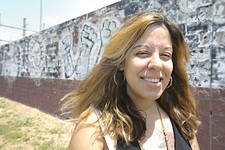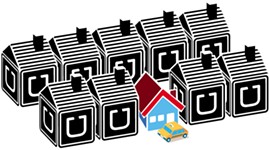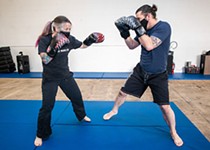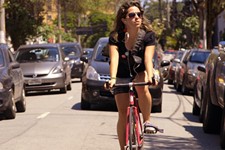There Goes the Neighborhood
City split over the latest in urban living options: short-term rentals
By Josh Rosenblatt, Fri., June 22, 2012
(Page 2 of 2)
Suspicions vs. Statistics
Council Member Kathie Tovo doesn't share that concern. She believes the city won't lose tax revenue if non-owner-occupied STRs are banned, because several new hotels are being built and proposed and because, well, people will always want to come to Austin. "Those visitors and industries will come to Austin regardless," she says. "We have lots of places for them now, several major hotels are under construction, and more are on the way. I believe we will still get that tax revenue." At the June 7 council meeting, Tovo added a friendly amendment to Laura Morrison's motion that would have granted commercial STR owners a three-year amnesty period to come into compliance with a ban. That proposal failed, also by a vote of 5-2.
Tovo says her primary concern when it comes to short-term rentals is the way they're clustered in certain ZIP codes. According to the auditor's report released at the end of April, 492 of the city's 1,500 STRs are located in 78704 (Central South Austin, from Lady Bird Lake to Ben White). That includes 127 non-owner-occupied properties and 194 whose ownership is unknown. According to city demographer Ryan Robinson, there are 23,000 total housing units in 78704, including 7,200 detached, single-family units, and 1.76% of those 7,200 are confirmed non-owner-occupied STRs. Add in half of the 194 properties whose ownership is unknown (as Riley did to come up with his proposal), and you've got just about 3%. Numbers that high, Tovo argues, are bound to have a negative impact on neighborhoods, from school enrollment numbers and the number of families with children, to affordability, crime statistics, and civic participation.
"Short-term rental occupants aren't going to get involved with their neighborhood associations, volunteer for park cleanup days, or sign up for campus advisory committees at neighborhood schools," Tovo says. "There are all kinds of ways we participate as a member of a neighborhood that you're not going to have."
And a lack of participation, opponents argue, will mean neighborhoods are less safe because there will be fewer people who recognize their neighbors and, more importantly, fewer people who recognize when someone is not a neighbor. As Zilker's Andrew Elder puts it: STRs "remove eyes on the street" and "create blind spots where we don't expect our friends and neighbors to be going" and situations where there is "no neighbor sitting on the front lawn watching out for my interests, my children."
This is where the language of the anti-STR arguments gets a little soft. Tovo says STRs "degrade the fabric of our communities," that neighborhoods rely on active neighbors. Morrison talks about "anchors" and the need for families and schools to "stay vibrant." Even Riley, who wrote the first draft of the resolution that will allow non-owner-occupied STRs in residential areas, is worried that too many of the properties will lead to a "hollowing-out of our neighborhoods."
Yet even setting aside the small citywide percentage of commercial STRs, the numbers don't seem to bear out opponents' claims about the relationship between those properties and rising housing costs, declining family numbers, and increases in crime and code violations. The City Auditor's April report, first requested by council in January on a motion from Council Member Bill Spelman, shows that STRs result in no more 911 or 311 calls than do other residential properties. Ryan Robinson says the auditor's map – showing STR clustering in 78704 – and 2010 Census reports of a trend toward fewer families with children in that ZIP code may reflect a cause-and-effect relationship, but he acknowledges that's just his "professional opinion" based on what he calls "lumpy" data. And a report commissioned by the National Association of Realtors does indeed show that STRs can drive up real estate prices, but we have no local studies to the same effect. And it's a rather nebulous thing to attempt to legislate anyway: the "feeling" you should get from a neighborhood.
"That's why we're swimming through the molasses, because there's no way to quantify the effect these things are having," says Spelman, who, as a longtime professor at the LBJ School of Public Affairs at UT, prays at the altar of statistics rather than sentiment. "The hard edge of the argument – that STRs are causing more 911 and 311 complaints – was proven wrong by the auditor's report, so we're left with the soft edge of the argument." Spelman voted in favor of the Riley proposal, largely on the assumption that making STRs illegal (like bars in the 1920s) will only drive them underground and make them even harder to regulate. "We know what happens when we ban things," he reminded his colleagues before their vote two weeks ago. So the important thing, he argues, is to drag these properties into the light of legality so the city can regulate them. Anyway, he says that's what he'll be pushing for when the issue returns to council on June 28.
"The real question is: How do we get the STRs out there to come into compliance?" Spelman says. "Right now we have a stick, which is we can take away your permit. I think it would be nice if we could find some sort of a carrot as well: 'If you do this then there's some cookie the city can give you.' I don't know what that looks like yet, but I'm sure that if the stick is actually applied to some of the few bad actors out there – the 'party houses' or homes with too many code complaints – it will encourage everyone to come into compliance."
Got something to say on the subject? Send a letter to the editor.











